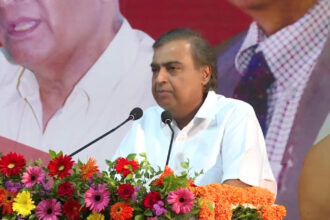
The Supreme Court will today (Wednesday) start hearing multiple petitions challenging the Waqf (Amendment) Act, 2025. The new law, which officially came into effect on April 8 after being passed in both the Lok Sabha and Rajya Sabha, is now being questioned for its constitutional validity.
Several BJP-ruled states have decided to support and defend the Act in court, while opposition parties and leaders have strongly opposed it. Here’s a simple breakdown of what’s happening and what you need to know:

10 Key Points on Waqf Amendment Act in Supreme Court
- Waqf (Amendment) Act, 2025:
The new law aims to reform how Waqf properties are managed. The Centre calls it a historic reform that benefits the Muslim community. However, opposition parties have labelled it as “anti-Muslim” and “unconstitutional.” - Bill Passed in Parliament:
In the Lok Sabha, 232 MPs voted in favour of the bill out of 288. In the Rajya Sabha, the vote count was 128 in favour and 95 against. - Supreme Court Hearing Begins:
The hearing will be led by a bench headed by Chief Justice of India Sanjiv Khanna, along with Justices Sanjay Kumar and KV Viswanathan. Around 10 petitions are scheduled to be heard today. - What the SC Said Earlier:
The Supreme Court had earlier clarified that courts cannot force the Parliament to make laws in a specific way, stating that law-making is the sole responsibility of the legislature. - Who Challenged the Waqf Act?
Petitions were filed by political parties such as the Congress, DMK, CPI, AAP, YSRCP, and public figures like actor Vijay (Tamilaga Vettri Kazhagam), along with organizations like the All India Muslim Personal Law Board. - AIMIM Chief’s Opposition:
Asaduddin Owaisi, leader of AIMIM, filed a petition saying the Act violates the fundamental rights of Muslims and must be withdrawn. - Tamil Nadu’s Challenge:
The ruling DMK government in Tamil Nadu challenged the Act, claiming it affects 5 million Muslims in the state and around 200 million across India. The Tamil Nadu Assembly had earlier passed a resolution asking the Centre to roll back the law.Read More: Murshidabad Waqf Protests: BSF Repositioned, But Community Still Feels Targeted
- Rajasthan Government Supports Act:
The BJP-led Rajasthan government has filed an application to defend the Waqf law, calling it transparent and constitutionally valid. - Uttarakhand Waqf Board Backs Law:
The board has requested the Supreme Court to allow them to share legal and factual details in support of the Waqf (Amendment) Act. States like Madhya Pradesh, Assam, and Maharashtra have also come forward to support the law. - Centre’s Clarification:
The government insists the law is not against Muslims but aims to fix earlier mistakes. Union Minister Kiren Rijiju said it ensures no one can illegally occupy someone else’s land and criticizes the earlier version of the Waqf Act for giving too much power to the Waqf Boards.Also see: Waqf Violence Escalates: Bangladeshi Miscreants in Bengal Spark Alarm
What is the Waqf (Amendment) Act?
The Waqf Act governs the management of Waqf properties (charitable assets dedicated for religious or charitable purposes in Islam). The Waqf (Amendment) Act, 2025, changes some of its rules to increase transparency and reduce misuse—but it’s become a matter of political and legal debate.












